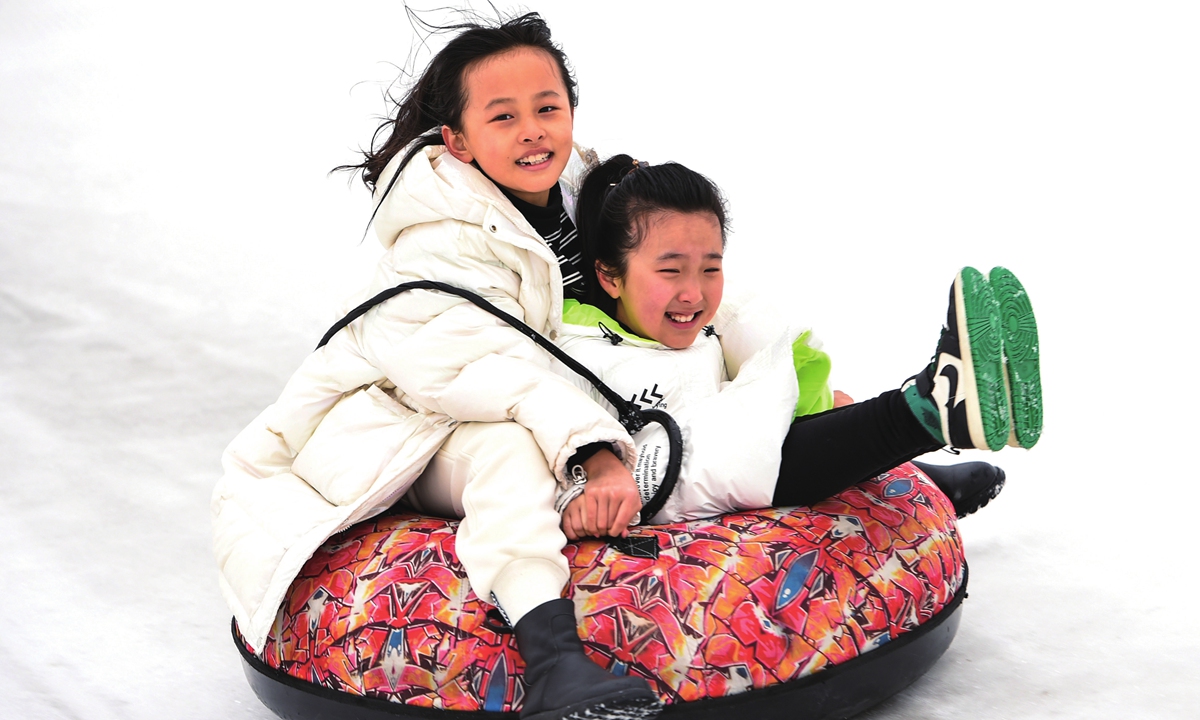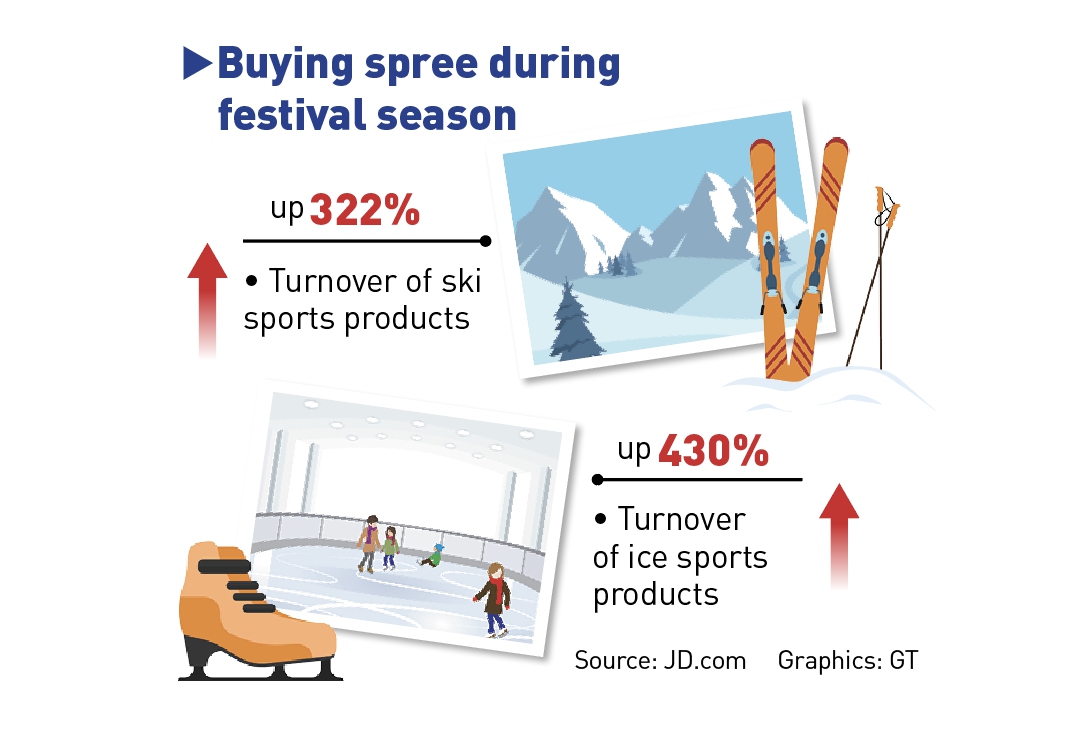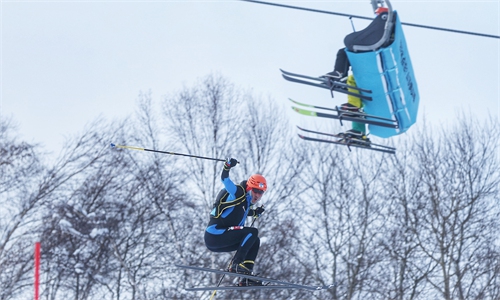China’s nascent winter sports industry gains momentum, thanks to Beijing Winter Olympics
Beijing 2022 to create long-lasting legacy

Children play Snow Tubes at Tuoshan Ski Resort in Qingzhou, East China's Shandong Province on Feburary 13, 2022. Photo: cnsphoto
No matter how COVID-19 threatens outdoor activities and has disrupted the tourism economy, China's nascent winter sports industry continues to gain momentum, boosted by the Beijing 2022 Winter Olympic Games.
From the Team China reaching a record high gold medal tally at the Beijing 2022 Winter Olympic Games to the Gu Ailing effect, Chinese people have discovered a new level of interest in ice and snow sports - a leisure activity that few were familiar with a decade ago.
During a Thursday press conference, officials from the General Administration of Sport of China said by the beginning of 2021, China has built 654 standard ice rinks, up 317 percent compared with 2015; and 803 indoor and outdoor ski resorts, up 41 percent from 2015's level.
The official also said China is researching building more emulational ice rinks and mobile ice rinks. The standards for building mobile ice rinks will be published by the end of 2022.
After Beijing's successful Winter Olympics bid in 2015, China has lifted the number of participants in winter sports to 346 million, nearly a quarter of the nation's population.
As an increasing significant industry contributing to economic growth, winter sports have found a place in the national spotlight.
According to a winter sport tourism report by the China Tourism Academy in January, around 323.3 billion yuan ($51 billion) could be generated from tourism-related revenue in the ice and snow sports in 2021-2022.
Another report on the winter sports industry found the scale of China's snow and ice industry rose from 270 billion yuan to 600 billion yuan between 2015 and 2020. The world's second largest economy is now eyeing a target of 1 trillion yuan by 2025.
Rising popularity
Winter sports - in particular skiing and snowboarding - though relatively costly are gaining popularity in China.
During the Spring Festival holidays which overlap with the global winter sports event, "the Beijing Winter Olympic Games spurred a wave of consumption on winter sports.
The number of visits to skating rinks, ski resorts, ice and snow theme parks rose sharply. Indoor ice hockey, skating and skiing also boomed," Gao Feng, spokesperson from the Chinese commerce ministry told press in early February.
A nationwide fever for winter sports was partly reflected by the hot sales of ski equipment on e-commerce platforms.
Skiing related product sales surged 322 percent year-on-year on Chinese e-commerce platform JD.com during the Spring Festival holidays, while sales of skating related products skyrocketed 430 percent compared with the same period last year.
A similar trend was recorded on another popular e-commerce platform under Alibaba. Tmall.com said ski equipment sales grew 180 percent year-on-year during the first four days of the Spring Festival holidays. "People's passion in winter sports was completely spurred on during this year's Spring Festival," Tmall.com said in a statement sent to the Global Times.
From young kids to their parents, more and more Chinese swarmed to ski resorts nationwide this winter, driving up the winter sports tourism economy.
"Although winter sports are popular in southern China, the geographical and climate conditions only allow a very short period of time for winter sport lovers. That's why many people choose to visit the northern regions to ski. But the Beijing 2022 has an outstanding driving effect," Wang Linbin, a deputy manager of Shanglianggang Ski Resort in Ningbo, East China's Zhejiang Province, told the Global Times.
He said the Winter Olympics will create a long-lasting legacy for China's ice and snow sports.
"According to international development experience of winter sports, when the GDP per capita of a country surpassed $10,000, its winter sports will have a booming growth. In 2021, China's GDP per capita has surpassed $12,000, laying a solid foundation of winter sports development," a Wednesday article of Economic Daily wrote.
A lucrative market

Graphics: GT
As winter sports gain popularity domestically, some global sportswear brands and companies along the winter sports industry are looking forward huge opportunities in the lucrative market.
Requests and discussion about Canadian brands Arc'teryx and Lululemon became hot after the opening ceremony of the Beijing 2022 on February 4.
In addition, the popularity of winter sports in China will make automated snow producers pay more attention to the emerging market.
TechnoAlpin, an Italy-based winter sports equipment company, is providing snowmaking equipment and system construction services for all snow venues at the Beijing 2022 Winter Olympics.
Many athletes at Beijing 2022 have praised the quality of snow and China's ice rink.
Lü Shengming, marketing and sales director of TechnoAlpin China, told the Global Times on Thursday that after the Beijing 2022, his company will continue to focus on the Chinese market and strengthen cooperation with more ski resorts in different areas of China, such as snow venues in Beijing and Songhua Lake in Northeast China's Jilin Province.
He noted that the company will build more manufacturing bases and R&D centers in China to promote the development of the country's winter sports industry.
"Now more and more young people, especially teenagers, have participated in winter sports. I believe that the Chinese winter sports market is sustainable," Lü said.
As the first equipment supplier in the world to achieve fully automated snow making, the company's snow-making machine only needs 0.2 to 0.5 kilowatt hours of power to produce 1 cubic meter of snow, according to Lü, which has greatly improved the utilization of water and electricity resources.

Beijing 2022 Winter Olympic Games fuels economy Infographic: GT

